Pre-school children very often do not have the opportunity to acquire basic skills before starting primary school. According to a study by C. Juel (1988 Learning to Read and Write: A Longitudinal Study of 54 Children from First through Fourth Grades. Journal of Educational Psychology, 80, 437-447.), As many as 88% of children with reading difficulties in first grade Primary school will remain with this problem also in the fourth grade. This problem – inequality of opportunities among children – was also noticed by, among others, the Council of Europe, which in 2019 issued recommendations on high-quality early childhood education and care systems.

The above issues inspired the partners of the “ABIbooks” project to jointly – as part of an international partnership – develop interactive publications supporting the youngest (preschool children) in acquiring basic skills in early childhood education. As part of the project, training materials based on storytelling and interactive teaching for teachers and parents will also be developed.

On February 9-11, 2022, representatives of the ARTeria Foundation, Anna Ochmann and Jakub Karch, took part in the first international partnership meeting of the “ABIbooks” project, which took place in Paris. The meeting was organized by Les Apprimeurs from France – project coordinator, and the meeting was also attended by representatives of other partner organizations: Logopsycom (Belgium), Arsakeio Kindergarten of Patras (Greece), Scoala Gimnaziala Nr. 16 Take Ionescu (Romania) and Direzione Didattica Statale Bastia Umbra (Italy).

The meeting began with the presentation of partner institutions as well as the genesis and goals of the project. The most important goals of the project and the work plan for the coming months were discussed: the creation of a publicly available digital library of already existing interactive books for children, collected in one place on the project platform, and the initial assumptions related to the development of project interactive books by partners. The initial versions of the logo and the project website plan were also presented, as well as a number of issues related to the implementation of project activities – management, promotion, dissemination, evaluation or cooperation (communication) between partners.

We invite you to follow the progress of the project on our website and on social media.
The project is co-financed by the Erasmus+ programme of the European Union.
